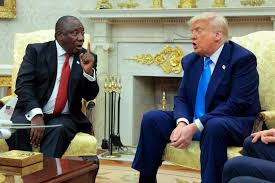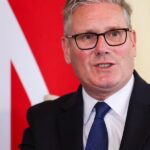South African President Cyril Ramaphosa is facing an uphill battle in repairing diplomatic ties with former U.S. President Donald Trump, whose potential return to the White House in 2025 could reshape U.S.-South Africa relations. Despite Ramaphosa’s efforts to maintain a balanced foreign policy, Trump’s recent criticisms of South Africa—ranging from trade disputes to geopolitical alignment—suggest that a smooth reconciliation may be unlikely.
This article examines:
- The key friction points between Ramaphosa and Trump
- How South Africa’s foreign policy stance complicates relations
- The potential economic and political fallout if Trump wins re-election
- Whether Ramaphosa can navigate this diplomatic minefield
With global power dynamics shifting, South Africa’s relationship with the U.S. hangs in the balance.
The Rocky History: Trump and Ramaphosa’s Strained Past
Trade Wars and Tariffs
During his presidency (2017-2021), Trump clashed with South Africa on trade, particularly over:
- Steel and aluminum tariffs – The U.S. imposed levies on South African exports, citing national security concerns.
- Agricultural disputes – Trump threatened to remove South Africa from the African Growth and Opportunity Act (AGOA), which allows duty-free exports to the U.S.
- Auto industry tensions – South Africa’s auto sector, a key exporter to the U.S., faced uncertainty under Trump’s “America First” policies.
Political Clashes
- Land Reform Debate – Trump tweeted in 2018 that South Africa’s land expropriation policies were “killing farmers”, sparking outrage in Pretoria.
- Geopolitical Alignments – Trump’s administration viewed South Africa’s closer ties with Russia and China with suspicion.
Ramaphosa, meanwhile, tried to maintain non-aligned diplomacy, but Trump’s confrontational style made it difficult.
Why Ramaphosa Is Struggling to Reconcile with Trump Now
1. Trump’s Unpredictable Diplomacy
- Trump’s transactional approach means past grievances could resurface if he returns to power.
- His “loyalty-based” foreign policy favors nations that openly support his agenda—something Ramaphosa’s government has avoided.
2. South Africa’s Shifting Alliances
- BRICS Expansion – South Africa has deepened ties with China and Russia, both of which Trump openly opposes.
- Neutral Stance on Ukraine – Unlike Western allies, South Africa has refused to condemn Russia, angering U.S. hawks.
- ICC Tensions – The U.S. has long criticized South Africa’s stance on the International Criminal Court (ICC), which has targeted U.S. allies like Israel.
3. Domestic Pressures on Ramaphosa
- ANC’s Leftward Shift – The ruling African National Congress (ANC) faces pressure from pro-Russia and pro-China factions, limiting Ramaphosa’s flexibility.
- Economic Struggles – With South Africa’s economy stagnating, Ramaphosa needs U.S. investment, but Trump may demand political concessions in return.
What a Trump 2.0 Presidency Could Mean for South Africa
Economic Risks
- AGOA in Jeopardy – Trump could revoke or restrict South Africa’s trade benefits, hurting key industries.
- Investment Chill – U.S. firms may hesitate to expand in South Africa if diplomatic relations sour.
- Currency Volatility – A Trump-led trade war could weaken the rand, exacerbating inflation.
Geopolitical Consequences
- Isolation from the West – If South Africa is seen as too close to Russia/China, Trump may push for NATO and EU distancing.
- Security Cooperation at Risk – U.S. intelligence and anti-terror support could diminish.
Possible Silver Linings
- Direct Negotiation Style – Trump prefers bilateral deals, which could allow Ramaphosa to negotiate one-on-one concessions.
- Anti-China Sentiment – If South Africa reduces reliance on Beijing, Trump might offer alternative trade incentives.
Can Ramaphosa Fix This Relationship?
Diplomatic Options
- Private Assurance to Trump – Behind-the-scenes talks to address trade concerns.
- Moderate BRICS Rhetoric – Avoiding overt pro-Russia/China statements could ease tensions.
- Leverage U.S. Business Ties – Encouraging American corporations (like Tesla, Amazon) to invest could soften Trump’s stance.
Potential Roadblocks
- ANC Hardliners – If Ramaphosa is seen as kowtowing to the U.S., he could face backlash from his party.
- Trump’s Grudge-Bearing – The former president has a long memory for slights, and South Africa’s past neutrality may still rankle.
Conclusion: A High-Stakes Diplomatic Tightrope
President Ramaphosa’s attempts to repair relations with Donald Trump face significant hurdles, given the latter’s America-first ideology and South Africa’s multilateral foreign policy. If Trump wins in November, Pretoria may need to recalibrate its geopolitical stance or risk economic penalties.
For now, Ramaphosa must walk a fine line—balancing domestic political pressures with the need to maintain critical U.S. trade and investment ties. The coming months will reveal whether diplomatic pragmatism can overcome Trump’s transactional nationalism.


